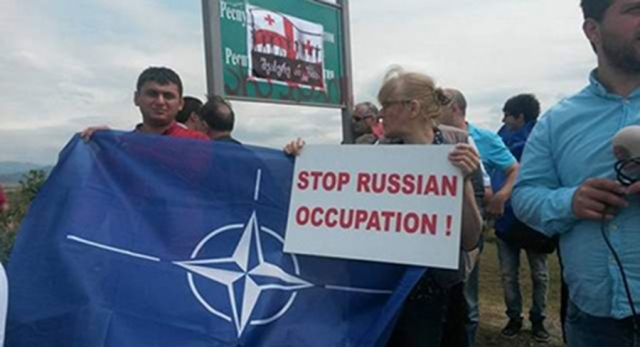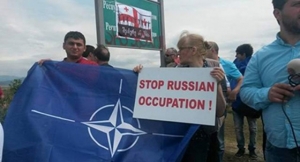Russia Creeping Closer
Soon after Georgia signed an air defense agreement with France, and NATO’s multi-national training “Fragile Spirit” began in the country, Russian occupational forces illegally placed signposts marking the so-called “state border” on the territory adjacent to the village of Tsitelubani of Gori municipality, and the village of Orchosani, occupied Akhalgori district, near Georgia’s main highway.
These markers, placed on July 10, cut part of the farmland of the Georgian local population and lay claim to 70% of the village, insolently appropriating 10 hectares of agricultural land. As a result locals in the area have lost their agricultural land and their livestock - in many cases their only livelihood. Furthermore, as a result of the illegal border installation, certain segments of the Baku-Supsa pipeline (near Orchosani) now falls within the territory under Russian control. The pipeline, also known as the Western Route Export Pipeline (WREP), at 833 km in length and with a capacity of 145,000 barrels a day, runs from Azerbaijan to the Georgian Black Sea terminal of Supsa and is operated by British Petroleum (BP).
“We’ve lost most of our fields. Russians said we are no longer allowed there,” a farmer from one of the villages affected by the creeping occupation told Georgia Today journalist Teona Surmava. BP Chief Spokesman in Georgia, Gia Gvaladze, stated: “This changes nothing. We don’t need physical access to maintain [the pipe].”
Marking borders by putting barbed wire fences was first started by the administrative boundary line (ABL) guard troops of the Russian Federation Security Service in April-May 2011, when fences were installed in the immediate vicinity of the villages of Didi Khurvaleti and Kveshi, southeast of Tskhinvali (South Ossetia’s administrative center). Later, a new wave of intensified fencing efforts by the Russian Federation took place from February 2013 in the village of Ditsi: metal fencing posts were installed in late May about 120 meters into Tbilisi administered territory. Also, in the village of Dvani, moving the administrative boundary line deeper into the Tbilisi controlled area resulted in cutting off local residents from an irrigational water supply.
International society has showed its support to Georgia regarding the fact. On July 13, John Kirby, spokesperson of the US department of State, said Russia should fulfill all of its obligations under the 2008 ceasefire agreement to withdraw its forces to pre-conflict positions. The EU issued a statement on July 15, saying “the installation of new demarcation signposts along the administrative boundary line of Georgia’s breakaway region of South Ossetia has led to tension in the area.” The statement re-affirmed the EU’s full support to Georgia’s internationally recognized borders and called on both sides for restraint and the use of existing mechanisms such as the Geneva International Discussions and the Incident Prevention and Response mechanism (IPRM) to defuse tensions. Individual countries, such as Ukraine and Lithuania, also released relevant statements, condemning the Russian actions.
However, as international society is currently occupied with the Iran nuclear talks and Greek bailout negotiations, dealing with the Russian occupation primarily falls to the Georgian government and Georgian society.
Georgia’s Foreign Ministry (MFA) in its first statement on the issue condemned the actions aimed against peace and security, which “violated the fundamental principles of international law.” Later, Tamar Beruchashvili, Minister of Foreign Affairs, met with the Head of the European Union Monitoring Mission in Georgia (EUMM) and expressed concern over the illegal placement of signposts. MFA officials also informed the diplomatic corps of Georgia and emphasized that the process within Georgia’s territory also violates the provisions of the 12 August 2008 Ceasefire Agreement. On July 15, the MFA handed a note of protest to the Ambassador Extraordinary and Plenipotentiary of Switzerland to Georgia for submission to the Russian side. Illegal borderization was also discussed at the Abashidze-Karasin meeting in Prague on July 15- bilateral talks which do not normally cover political issues. Georgia will further discuss the incident in the frames of the Geneva format.
Alongside the official diplomatic efforts, Georgian societal groups actively protested against the illegal Russian actions. On July 14, Georgian media representatives held a protest rally “No to Occupation” in the village of Khurvaleti and participants took down the Russian signposts which claimed “Republic of South Ossetia.” The Young Diplomat’s Club of Georgia and other youth organizations also organized protests against the “creeping occupation” of Russia. Young Georgians gathered with NATO and EU flags in Khurvaleti, near the occupational line. A demonstration is expected to be held in front of the Georgian State Administration building in Tbilisi on July 18.
Nino Japarashvili












